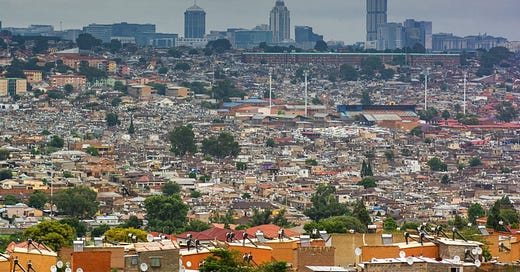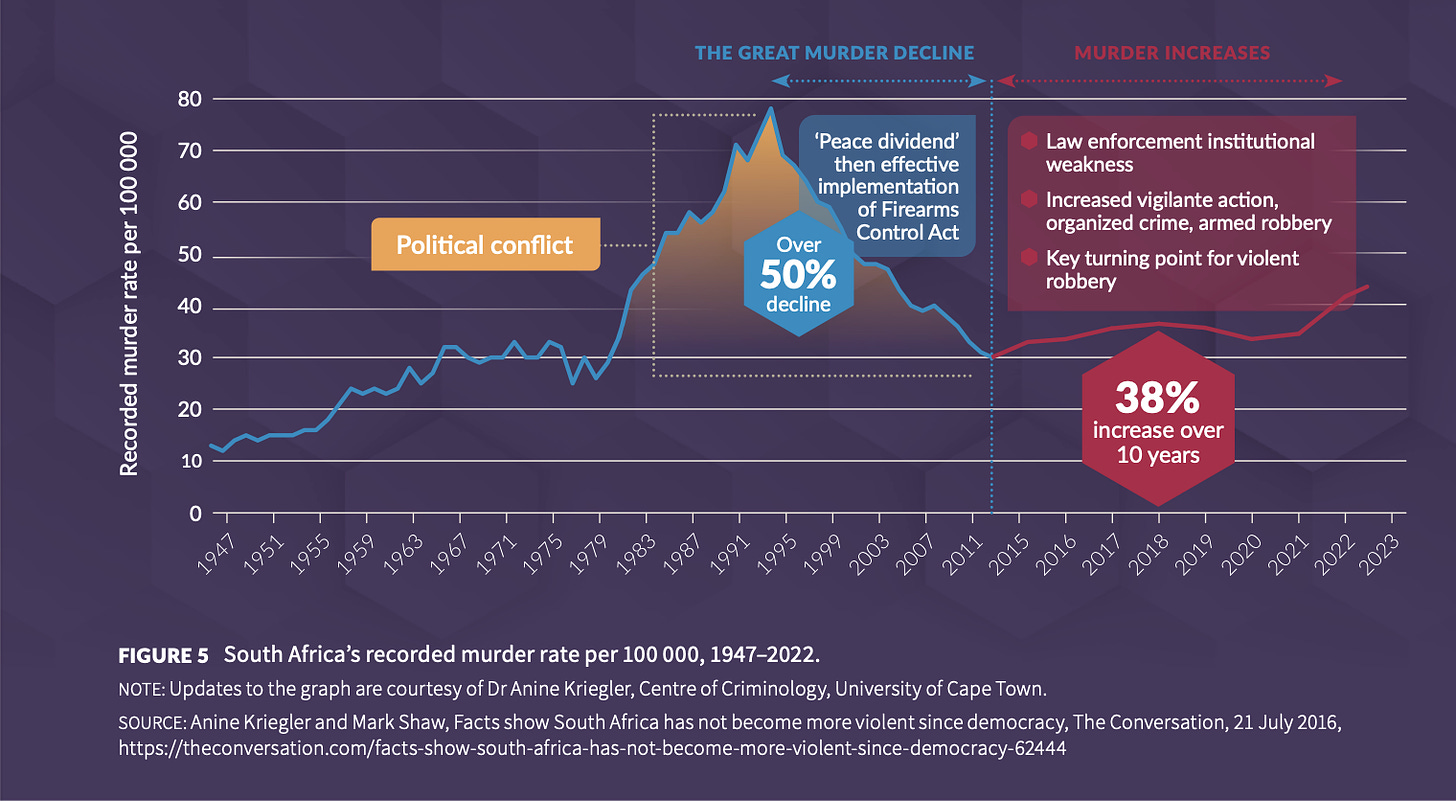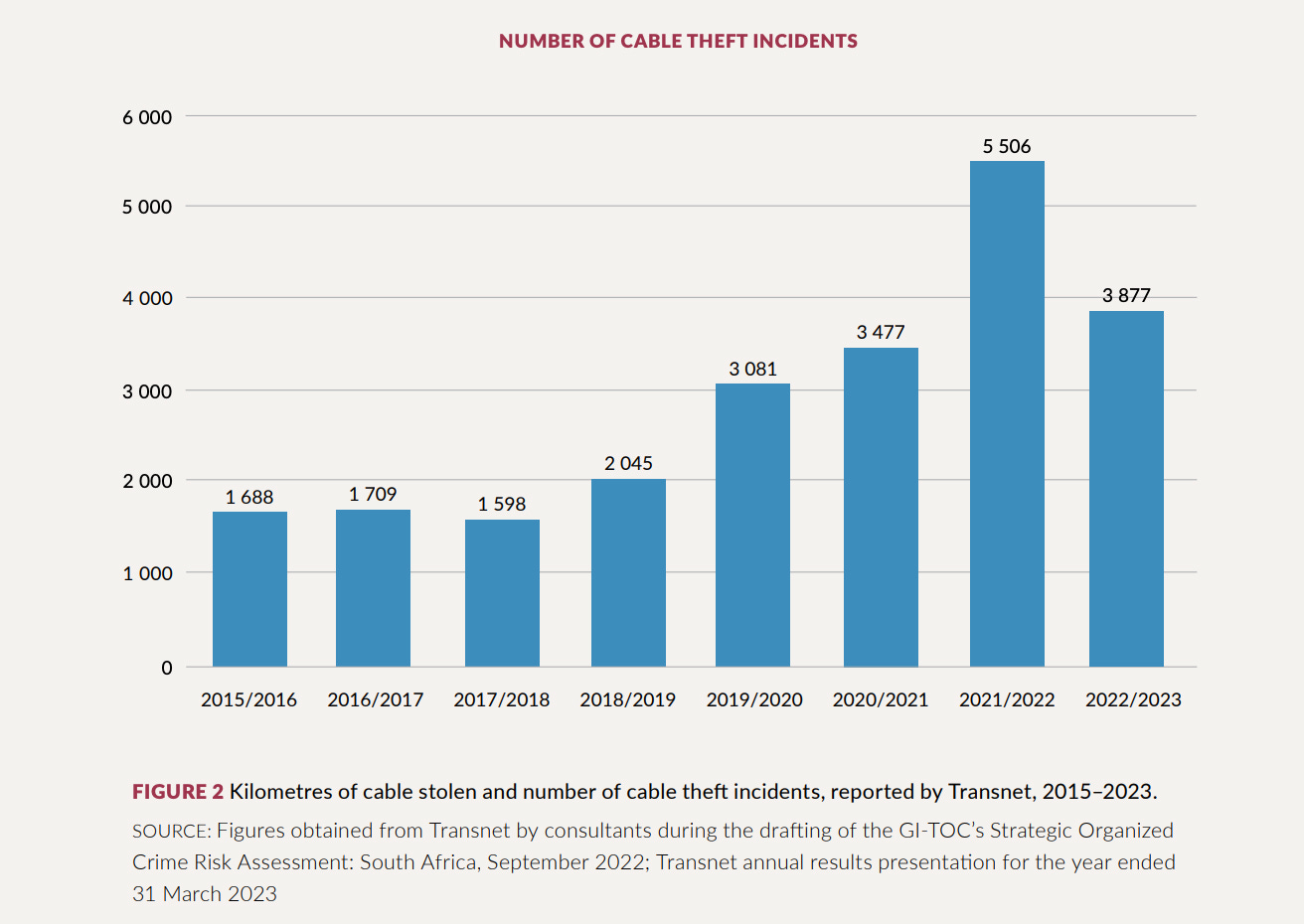The Story Behind South Africa's Most Important Elections Since Apartheid
South Africa is a political powder-keg standing before a critical juncture
I have recently taken an opportunity to work on the upcoming elections in South Africa.
These elections, due to be held on May 29, are regarded by many as South Africa’s first ever chance to truly challenge the ruling ANC party, which since 1994 has mismanaged- and plundered- the country into its present state of crisis.
Politically, economically, and socially, the situation in South Africa is dire.
Here are some brief statistics conveying the severity of its problems:
South Africa has a Gini coefficient of ~67, meaning it has the world’s highest level of income inequality. Its Gini coefficient was 0.59 in 1994.
The real unemployment rate is estimated at around 44.1% of the population
The average citizen spent 19.9% of 2023 with zero power due to rolling blackouts
South Africa’s homicide rate in 2022-2023 was 45 per 100,000 people, one of the highest in the world and a 50% increase from 2012-2013
South Africa has the world’s largest private security industry with over ~10,000 private security companies, reflecting the failure of the state to provide critical public services like policing and public safety
0.01% of the population (3500 people) owns 15% of national wealth
It would take considerable time to lay out South Africa’s current problems and their origins in full detail. But to put it concisely, South Africa is increasingly corrupt, unsafe, unequal, and unstable.
The country’s growing political and social instability is what many South Africans find the most concerning of all. These fears were spectacularly validated in 2021 when an entire province- KwaZulu Natal- collapsed into a state of total anarchy, mob violence and looting, galvanised by the active incitement of embittered former President Jacob Zuma. Many South Africans fear that this unprecedented episode of civil breakdown only marks a glimpse of things to come, given the country’s present trajectory.
The problem is political
The reason for this dismal state of affairs, put simply but accurately, is the ANC. Morally and politically triumphant in the wake of dismantling Apartheid, the party of Mandela has revealed itself with time to be a profound disappointment.
The ANC has dominated South African politics since the country’s first open elections in 1994, having never owned less than 57% of the 400 seats in the national assembly. The ANC is understood as representing the country’s black majority, who constitute 80% of the population; it is they who represent the ANC’s political base.
However, rather than ushering South Africa into a prosperous and harmonious future, the party’s officials have spent the better part of the last three decades enriching themselves at the expense of the state, allowing entire branches of government to become captured by criminal and corrupt elements, including the police and state energy sector.
‘Load shedding’- the euphemism for regular self-imposed power blackouts needed to avoid total grid shutdown- is in large part due to the capture of the public energy sector by organised crime and ANC corruption. Billions of dollars earmarked for maintaining South Africa’s ageing energy infrastructure are siphoned into the pockets of officials. Coal theft syndicates steal high-quality black coal and sell it on the black market; gangs take advantage of load shedding to steal tens of thousands of kilometres of copper cabling.
Infamously, former CEO of state-owned electricity company Eskom Andre de Ruyter was poisoned with cyanide in December 2022 as reward for his efforts in taking on the crime syndicates plaguing the company.
At this point, the ANC has transitioned from political party into outright political mafia, with an explicit policy of inserting political cadres across the entirety of the public sector to tighten its grip on power.
That the ANC can maintain such electoral dominance, even after three decades of being undeniably disastrous for the country, speaks to the power of its legacy as the party of liberation, as well as the ongoing primacy of racial identity in determining the way people in South Africa vote.
As has been explained to me by South Africans of all creeds, many black South Africans continue to vote for the ANC out of either loyalty, fear of change, identity affiliation, or simple habit. One of my local colleagues described it as a form of Stockholm syndrome.
This being said, the situation in South Africa is now so bad that many South Africans see the approaching juncture as existential. If the ANC is not dislodged from power to at least some degree, the country may well slide into irreversible political, economic and social breakdown.
The stakes of this election could not be higher.
2024: The End of an Era
Elections in South Africa have typically functioned as coronation rather than contest for the ANC- until now. For the first time since South Africa became an open democracy, the ANC is projected to register less than 50% of the national vote. This means the 2024 elections are an unprecedented opportunity to meaningfully challenge the ANC, in light of South Africa’s parliamentary system of proportional representation.
Still, deposing the ANC won’t be easy, and the way forward is fraught with danger.
The main opposition party, the Democratic Alliance (DA), is informally but potently understood as being the party for white people (who constitute ~7% of the population). As such it has a terrible problem with attracting votes and politicians from the country’s black majority, meaning its vote share is permanently restricted to within 20-30%. This is why the DA has formed a coalition with over 10 other parties to form a Multi-Party Charter, hoping to win enough seats to be able to form a winning majority against the ANC.
The other major player in South Africa is the EFF (Economic Freedom Fighters), which despite only beginning in 2014 has risen rapidly to become the country’s third largest party, to the point that it is now placed to challenge the DA as the official opposition party. This is deeply concerning. The EFF is a Marxist-Leninist, black nationalist party led by radical demagogue Julius Malema, who is on the record refusing to rule out that he would call for the future killing of white people in South Africa. (The video below is quite remarkable)
Under Malema, who is ex-ANC, the EFF is continuing to amass momentum and the latest polling has the EFF hovering around the 20% share of the national vote- about the same as the DA.
And yet unbelievably, the EFF are not the most dangerous political force operating in South Africa today. The 2024 elections are haunted by the spectre of Jacob Zuma, who is on the vengeful warpath against the ANC with the openly militaristic MK (uMkhonto we Sizwe) party. The MK have openly threatened large-scale violence if they are barred from running by the courts:
“We are sending a loud and clear message to the ANC that if these courts, which are sometimes captured, if they stop MK, there will be anarchy in this country. There will be riots like you’ve never seen in this country. There will be no elections. No South Africans will go to the polls.”
South Africa has become a political powder-keg. The political change afoot is fraught with danger; with the reward of deposing the ANC comes the risk that something worse takes its place.
Concluding thoughts
Either way, it is all but certain that this will be an election of coalitions. If the DA’s Multi-Party Charter fails to attain a majority of the 400 parliamentary seats available, the ANC will have to form a reluctant coalition of some kind in order to hold power. A ruling coalition between the ANC and the EFF would be a terrifying nightmare scenario for South Africa- fortunately, both parties seem to sincerely hate each other. Meanwhile, scores of new micro parties have emerged with the hope of acquiring a seat at the table of prospective coalitions, highlighting the public’s desperation for change.
What is clear is that these are South Africa’s most important elections since the end of Apartheid. The country stands before a critical juncture: either it corrects its course and preserves its democracy, or the powder keg will be set alight.






I knew things were bad in RSA, but you have articulated a real powder keg. No wonder so many are abandoning the country.
Thanks for this. And please be careful.